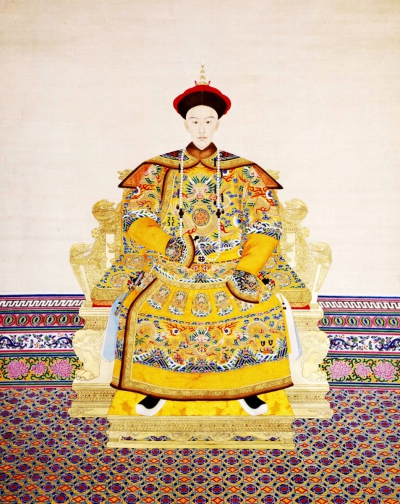Empress Dowager Cixi (Chinese: ; pinyin: Cx Tihu [ts. t.x]; Manchu: Tsysi taiheo; formerly romanised as Empress Dowager T'zu-hsi; 29 November 1835 15 November 1908), of the Manchu Yehe Nara clan, was a Chinese noblewoman, concubine and later regent who effectively controlled the Chinese government in the late Qing dynasty for 47 years, from 1861 until her death in 1908. Selected as a concubine of the Xianfeng Emperor in her adolescence, she gave birth to a son, Zaichun, in 1856. After the Xianfeng Emperor's death in 1861, the young boy became the Tongzhi Emperor, and she assumed the role of co-empress dowager, alongside the Emperor's widow, Empress Dowager Ci'an. Cixi ousted a group of regents appointed by the late emperor and assumed the regency along with Ci'an, who later died under mysterious circumstances. Cixi then consolidated control over the dynasty when she installed her nephew as the Guangxu Emperor at the death of her son, the Tongzhi Emperor, in 1875. This was contrary to the traditional rules of succession of the Qing dynasty that had ruled China since 1644.
Cixi supervised the Tongzhi Restoration, a series of moderate reforms that helped the regime survive until 1911. Although Cixi refused to adopt Western models of government, she supported technological and military reforms and the Self-Strengthening Movement. She supported the principles of the Hundred Days' Reforms of 1898, but feared that sudden implementation, without bureaucratic support, would be disruptive and that the Japanese and other foreign powers would take advantage of any weakness. She placed the Guangxu Emperor, who, she thought, had tried to assassinate her, under virtual house arrest for supporting radical reformers, publicly executing the main reformers. After the Boxer Rebellion led to invasion by Allied armies, Cixi initially backed the Boxer groups and declared war on the invaders. The ensuing defeat was a stunning humiliation. When Cixi returned to Beijing from Xi'an, where she had taken the emperor, she became friendly to foreigners in the capital and began to implement fiscal and institutional reforms aimed to turn China into a constitutional monarchy. The deaths of both Cixi and the Guangxu Emperor in November 1908 left the court in hands of Manchu conservatives, a child, Puyi, on the throne, and a restless, deeply divided society.
Historians both in China and abroad have debated her legacy. Conventionally denounced as a ruthless despot whose reactionary policies although successfully self-serving in prolonging the ailing Qing dynasty led to its humiliation and utter downfall in the Wuchang Uprising, revisionists suggested that Nationalist and Communist revolutionaries scapegoated her for deep-rooted problems beyond salvage, and lauded her maintenance of political order as well as numerous effective, if belated reforms including the abolition of slavery, ancient torturous punishments and the ancient examination system in her ailing years, the latter supplanted by institutions including the new Peking University.
Emperor Guangxu (14 August 1871 – 14 November 1908), personal name Zaitian, was the tenth Emperor of the Qing dynasty, and the ninth Qing emperor to rule over China proper. His reign lasted from 1875 to 1908, but in practice he ruled, without Empress Dowager Cixi's influence, only from 1889 to 1898. He initiated the Hundred Days' Reform, but was abruptly stopped when the empress dowager launched a coup in 1898, after which he became powerless and was held under house arrest until his death. His era name, "Guangxu", means "glorious succession".
The emperor died in 1908 and it was widely suspected at the time that he had been poisoned. A forensic examination on his remains confirmed in 2008 that the cause of death was arsenic poisoning. The level of arsenic in his remains was 2,000 times higher than normal.

1875Feb, 25
Guangxu Emperor of Qing dynasty China begins his reign, under Empress Dowager Cixi's regency.
Choose Another Date
Events on 1875
- 25Feb
Empress Dowager Cixi
Guangxu Emperor of Qing dynasty China begins his reign, under Empress Dowager Cixi's regency. - 3Mar
Opéra-Comique
Georges Bizet's opera Carmen receives its première at the Opéra-Comique in Paris. - 15Mar
John McCloskey
Archbishop of New York John McCloskey is named the first cardinal in the United States.

 English
English  español
español  français
français  português
português  русский
русский  العربية
العربية  简体中文
简体中文 